Analyzing the Evolution of Mental Health Service Delivery Systems
VerifiedAdded on 2019/12/28
|5
|1469
|132
Essay
AI Summary
This essay analyzes the significant changes in mental health service delivery and philosophy since the deinstitutionalization movement, which began in the 1960s with the aim of improving treatment and cutting government budgets. It examines the impact of deinstitutionalization on clients, agencies, and counselors, highlighting challenges faced by patients with serious mental illnesses in community settings, and the need for specialized training for healthcare professionals. The essay discusses approaches such as Assertive Community Treatment and the adoption of recovery-oriented frameworks, particularly in Australia, which emphasize patient well-being, self-determination, and the integration of various community support services. It also references the Australian National Standards for Mental Health Services and how these standards are used to assess the recovery orientation of mental health services and programs, ensuring they are tailored to the unique needs of the patients.
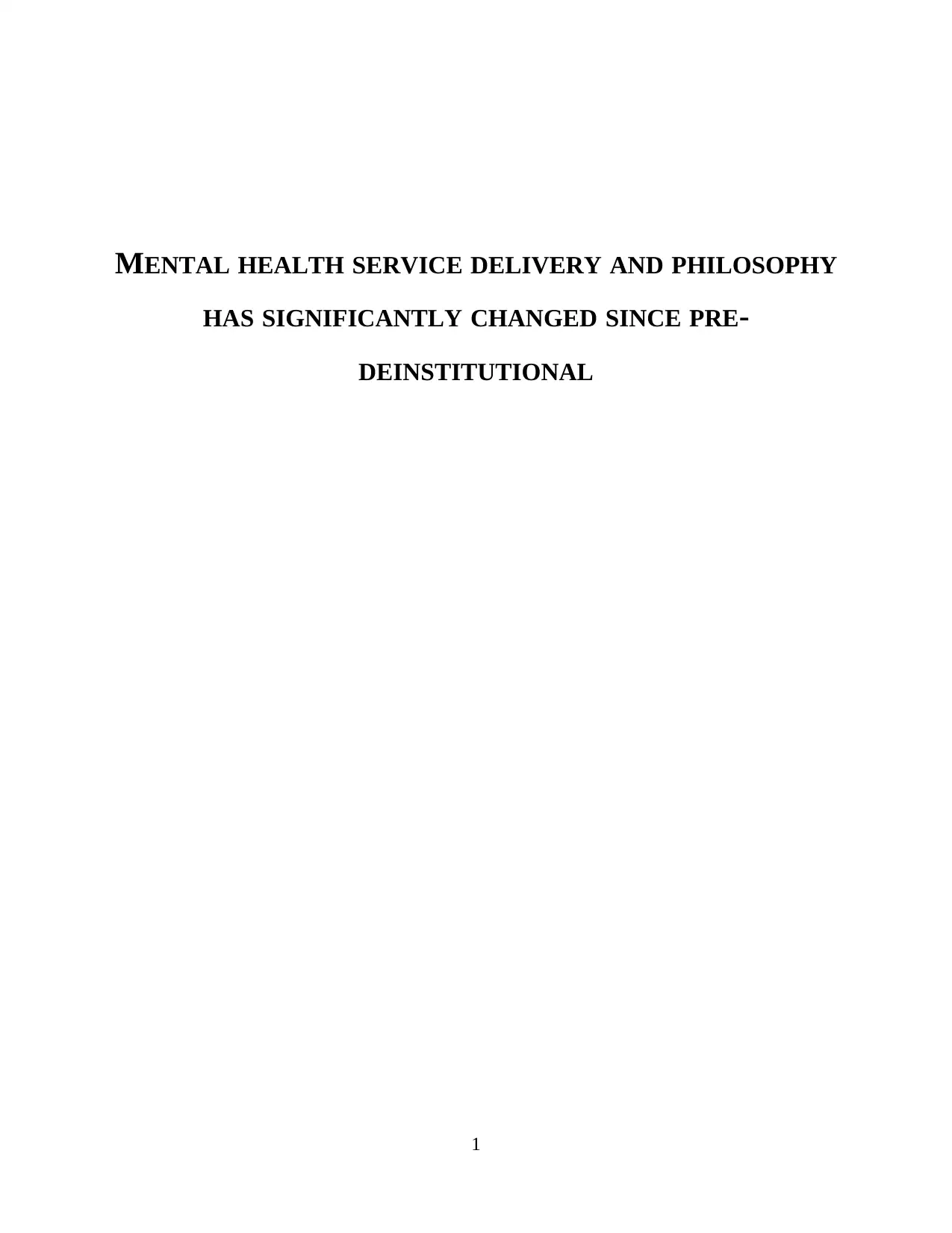
MENTAL HEALTH SERVICE DELIVERY AND PHILOSOPHY
HAS SIGNIFICANTLY CHANGED SINCE PRE-
DEINSTITUTIONAL
1
HAS SIGNIFICANTLY CHANGED SINCE PRE-
DEINSTITUTIONAL
1
Paraphrase This Document
Need a fresh take? Get an instant paraphrase of this document with our AI Paraphraser
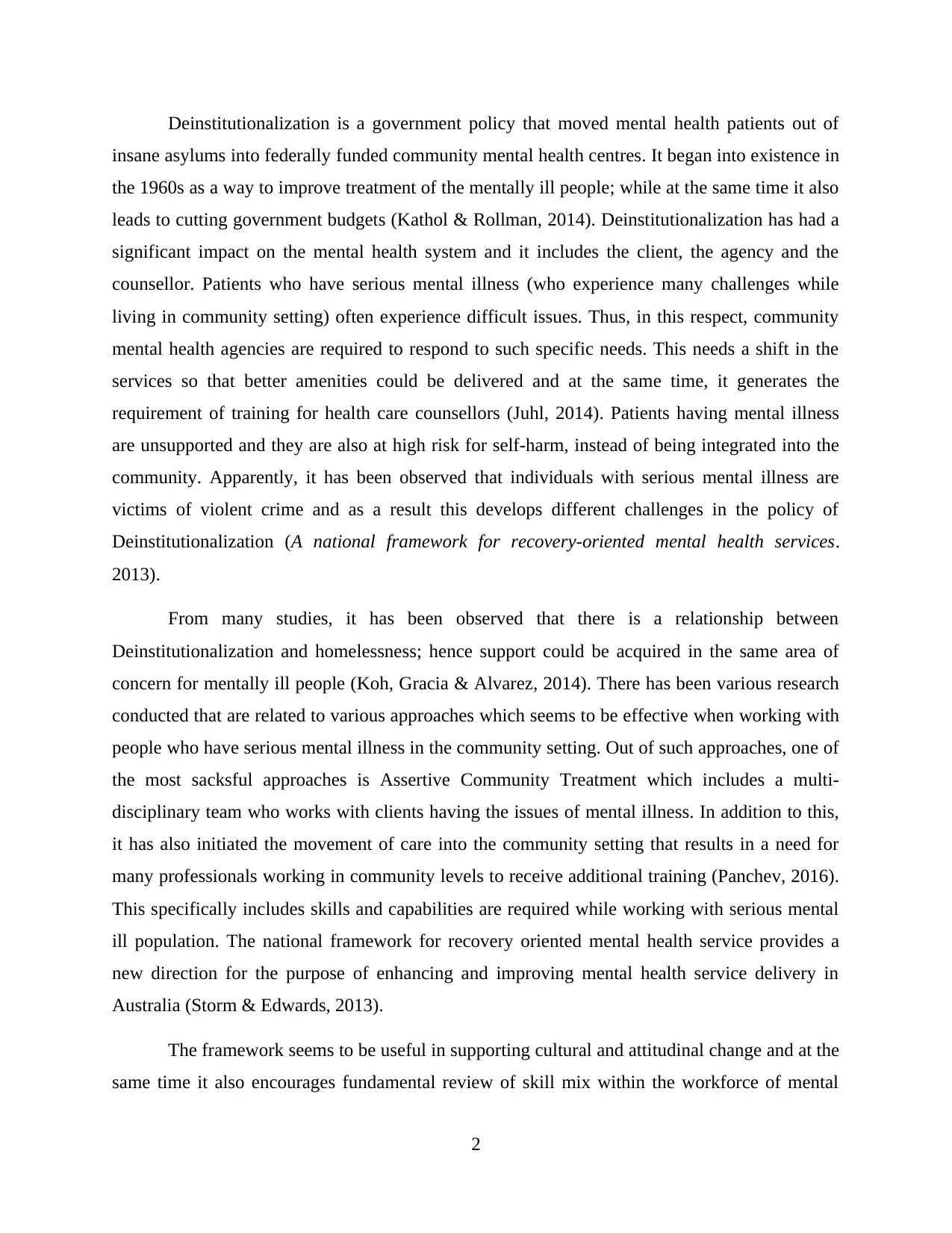
Deinstitutionalization is a government policy that moved mental health patients out of
insane asylums into federally funded community mental health centres. It began into existence in
the 1960s as a way to improve treatment of the mentally ill people; while at the same time it also
leads to cutting government budgets (Kathol & Rollman, 2014). Deinstitutionalization has had a
significant impact on the mental health system and it includes the client, the agency and the
counsellor. Patients who have serious mental illness (who experience many challenges while
living in community setting) often experience difficult issues. Thus, in this respect, community
mental health agencies are required to respond to such specific needs. This needs a shift in the
services so that better amenities could be delivered and at the same time, it generates the
requirement of training for health care counsellors (Juhl, 2014). Patients having mental illness
are unsupported and they are also at high risk for self-harm, instead of being integrated into the
community. Apparently, it has been observed that individuals with serious mental illness are
victims of violent crime and as a result this develops different challenges in the policy of
Deinstitutionalization (A national framework for recovery-oriented mental health services.
2013).
From many studies, it has been observed that there is a relationship between
Deinstitutionalization and homelessness; hence support could be acquired in the same area of
concern for mentally ill people (Koh, Gracia & Alvarez, 2014). There has been various research
conducted that are related to various approaches which seems to be effective when working with
people who have serious mental illness in the community setting. Out of such approaches, one of
the most sacksful approaches is Assertive Community Treatment which includes a multi-
disciplinary team who works with clients having the issues of mental illness. In addition to this,
it has also initiated the movement of care into the community setting that results in a need for
many professionals working in community levels to receive additional training (Panchev, 2016).
This specifically includes skills and capabilities are required while working with serious mental
ill population. The national framework for recovery oriented mental health service provides a
new direction for the purpose of enhancing and improving mental health service delivery in
Australia (Storm & Edwards, 2013).
The framework seems to be useful in supporting cultural and attitudinal change and at the
same time it also encourages fundamental review of skill mix within the workforce of mental
2
insane asylums into federally funded community mental health centres. It began into existence in
the 1960s as a way to improve treatment of the mentally ill people; while at the same time it also
leads to cutting government budgets (Kathol & Rollman, 2014). Deinstitutionalization has had a
significant impact on the mental health system and it includes the client, the agency and the
counsellor. Patients who have serious mental illness (who experience many challenges while
living in community setting) often experience difficult issues. Thus, in this respect, community
mental health agencies are required to respond to such specific needs. This needs a shift in the
services so that better amenities could be delivered and at the same time, it generates the
requirement of training for health care counsellors (Juhl, 2014). Patients having mental illness
are unsupported and they are also at high risk for self-harm, instead of being integrated into the
community. Apparently, it has been observed that individuals with serious mental illness are
victims of violent crime and as a result this develops different challenges in the policy of
Deinstitutionalization (A national framework for recovery-oriented mental health services.
2013).
From many studies, it has been observed that there is a relationship between
Deinstitutionalization and homelessness; hence support could be acquired in the same area of
concern for mentally ill people (Koh, Gracia & Alvarez, 2014). There has been various research
conducted that are related to various approaches which seems to be effective when working with
people who have serious mental illness in the community setting. Out of such approaches, one of
the most sacksful approaches is Assertive Community Treatment which includes a multi-
disciplinary team who works with clients having the issues of mental illness. In addition to this,
it has also initiated the movement of care into the community setting that results in a need for
many professionals working in community levels to receive additional training (Panchev, 2016).
This specifically includes skills and capabilities are required while working with serious mental
ill population. The national framework for recovery oriented mental health service provides a
new direction for the purpose of enhancing and improving mental health service delivery in
Australia (Storm & Edwards, 2013).
The framework seems to be useful in supporting cultural and attitudinal change and at the
same time it also encourages fundamental review of skill mix within the workforce of mental
2
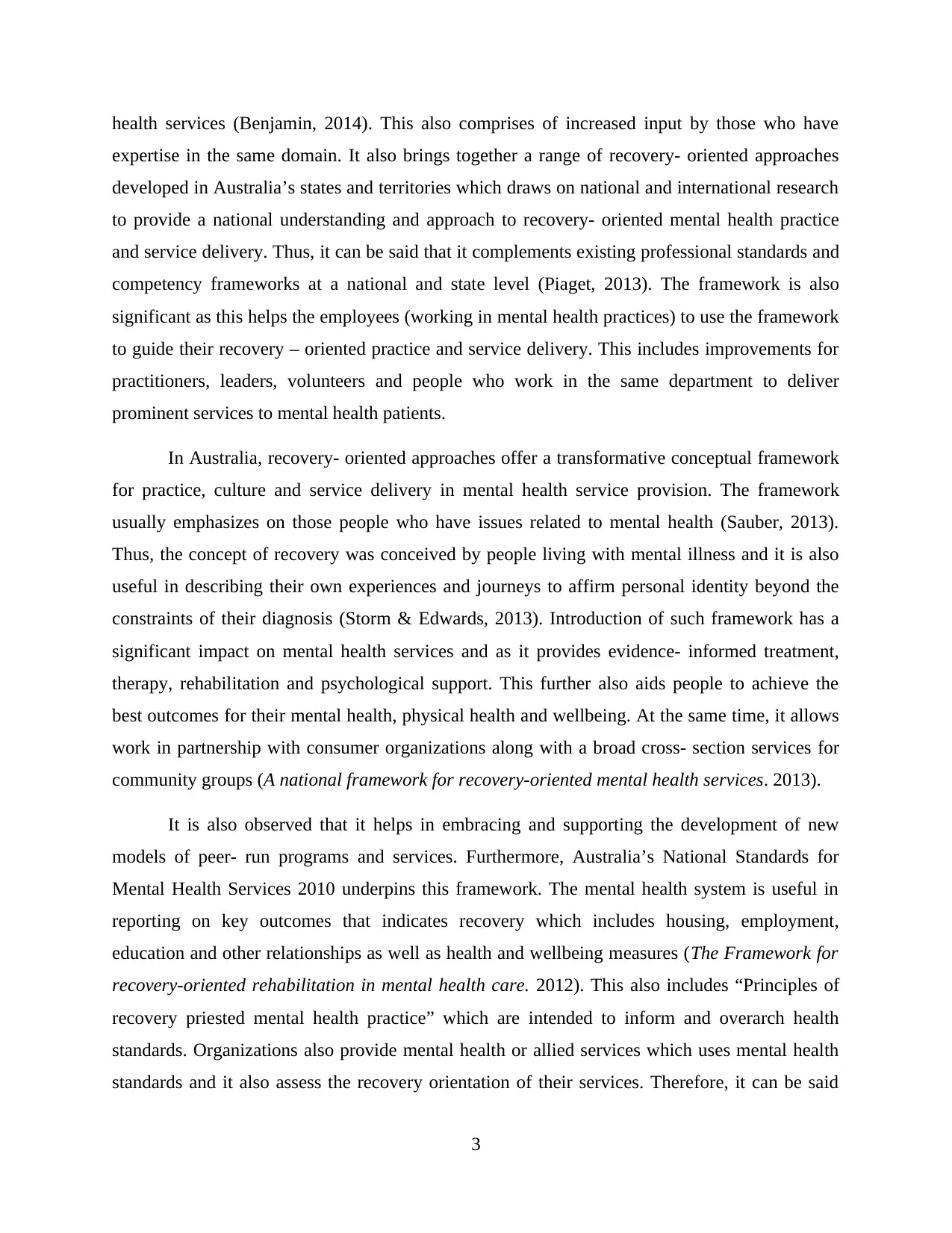
health services (Benjamin, 2014). This also comprises of increased input by those who have
expertise in the same domain. It also brings together a range of recovery- oriented approaches
developed in Australia’s states and territories which draws on national and international research
to provide a national understanding and approach to recovery- oriented mental health practice
and service delivery. Thus, it can be said that it complements existing professional standards and
competency frameworks at a national and state level (Piaget, 2013). The framework is also
significant as this helps the employees (working in mental health practices) to use the framework
to guide their recovery – oriented practice and service delivery. This includes improvements for
practitioners, leaders, volunteers and people who work in the same department to deliver
prominent services to mental health patients.
In Australia, recovery- oriented approaches offer a transformative conceptual framework
for practice, culture and service delivery in mental health service provision. The framework
usually emphasizes on those people who have issues related to mental health (Sauber, 2013).
Thus, the concept of recovery was conceived by people living with mental illness and it is also
useful in describing their own experiences and journeys to affirm personal identity beyond the
constraints of their diagnosis (Storm & Edwards, 2013). Introduction of such framework has a
significant impact on mental health services and as it provides evidence- informed treatment,
therapy, rehabilitation and psychological support. This further also aids people to achieve the
best outcomes for their mental health, physical health and wellbeing. At the same time, it allows
work in partnership with consumer organizations along with a broad cross- section services for
community groups (A national framework for recovery-oriented mental health services. 2013).
It is also observed that it helps in embracing and supporting the development of new
models of peer- run programs and services. Furthermore, Australia’s National Standards for
Mental Health Services 2010 underpins this framework. The mental health system is useful in
reporting on key outcomes that indicates recovery which includes housing, employment,
education and other relationships as well as health and wellbeing measures (The Framework for
recovery-oriented rehabilitation in mental health care. 2012). This also includes “Principles of
recovery priested mental health practice” which are intended to inform and overarch health
standards. Organizations also provide mental health or allied services which uses mental health
standards and it also assess the recovery orientation of their services. Therefore, it can be said
3
expertise in the same domain. It also brings together a range of recovery- oriented approaches
developed in Australia’s states and territories which draws on national and international research
to provide a national understanding and approach to recovery- oriented mental health practice
and service delivery. Thus, it can be said that it complements existing professional standards and
competency frameworks at a national and state level (Piaget, 2013). The framework is also
significant as this helps the employees (working in mental health practices) to use the framework
to guide their recovery – oriented practice and service delivery. This includes improvements for
practitioners, leaders, volunteers and people who work in the same department to deliver
prominent services to mental health patients.
In Australia, recovery- oriented approaches offer a transformative conceptual framework
for practice, culture and service delivery in mental health service provision. The framework
usually emphasizes on those people who have issues related to mental health (Sauber, 2013).
Thus, the concept of recovery was conceived by people living with mental illness and it is also
useful in describing their own experiences and journeys to affirm personal identity beyond the
constraints of their diagnosis (Storm & Edwards, 2013). Introduction of such framework has a
significant impact on mental health services and as it provides evidence- informed treatment,
therapy, rehabilitation and psychological support. This further also aids people to achieve the
best outcomes for their mental health, physical health and wellbeing. At the same time, it allows
work in partnership with consumer organizations along with a broad cross- section services for
community groups (A national framework for recovery-oriented mental health services. 2013).
It is also observed that it helps in embracing and supporting the development of new
models of peer- run programs and services. Furthermore, Australia’s National Standards for
Mental Health Services 2010 underpins this framework. The mental health system is useful in
reporting on key outcomes that indicates recovery which includes housing, employment,
education and other relationships as well as health and wellbeing measures (The Framework for
recovery-oriented rehabilitation in mental health care. 2012). This also includes “Principles of
recovery priested mental health practice” which are intended to inform and overarch health
standards. Organizations also provide mental health or allied services which uses mental health
standards and it also assess the recovery orientation of their services. Therefore, it can be said
3
⊘ This is a preview!⊘
Do you want full access?
Subscribe today to unlock all pages.

Trusted by 1+ million students worldwide
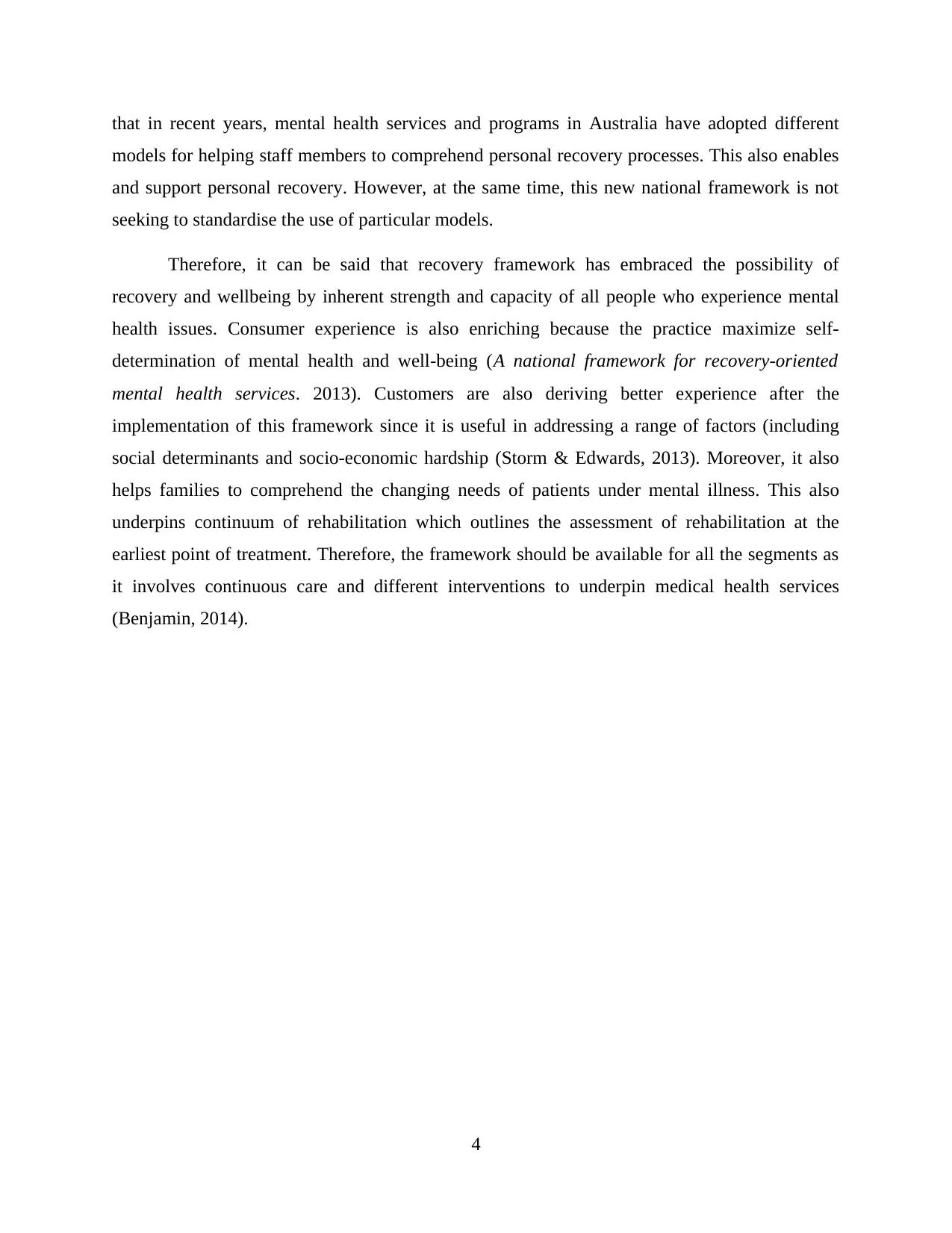
that in recent years, mental health services and programs in Australia have adopted different
models for helping staff members to comprehend personal recovery processes. This also enables
and support personal recovery. However, at the same time, this new national framework is not
seeking to standardise the use of particular models.
Therefore, it can be said that recovery framework has embraced the possibility of
recovery and wellbeing by inherent strength and capacity of all people who experience mental
health issues. Consumer experience is also enriching because the practice maximize self-
determination of mental health and well-being (A national framework for recovery-oriented
mental health services. 2013). Customers are also deriving better experience after the
implementation of this framework since it is useful in addressing a range of factors (including
social determinants and socio-economic hardship (Storm & Edwards, 2013). Moreover, it also
helps families to comprehend the changing needs of patients under mental illness. This also
underpins continuum of rehabilitation which outlines the assessment of rehabilitation at the
earliest point of treatment. Therefore, the framework should be available for all the segments as
it involves continuous care and different interventions to underpin medical health services
(Benjamin, 2014).
4
models for helping staff members to comprehend personal recovery processes. This also enables
and support personal recovery. However, at the same time, this new national framework is not
seeking to standardise the use of particular models.
Therefore, it can be said that recovery framework has embraced the possibility of
recovery and wellbeing by inherent strength and capacity of all people who experience mental
health issues. Consumer experience is also enriching because the practice maximize self-
determination of mental health and well-being (A national framework for recovery-oriented
mental health services. 2013). Customers are also deriving better experience after the
implementation of this framework since it is useful in addressing a range of factors (including
social determinants and socio-economic hardship (Storm & Edwards, 2013). Moreover, it also
helps families to comprehend the changing needs of patients under mental illness. This also
underpins continuum of rehabilitation which outlines the assessment of rehabilitation at the
earliest point of treatment. Therefore, the framework should be available for all the segments as
it involves continuous care and different interventions to underpin medical health services
(Benjamin, 2014).
4
Paraphrase This Document
Need a fresh take? Get an instant paraphrase of this document with our AI Paraphraser
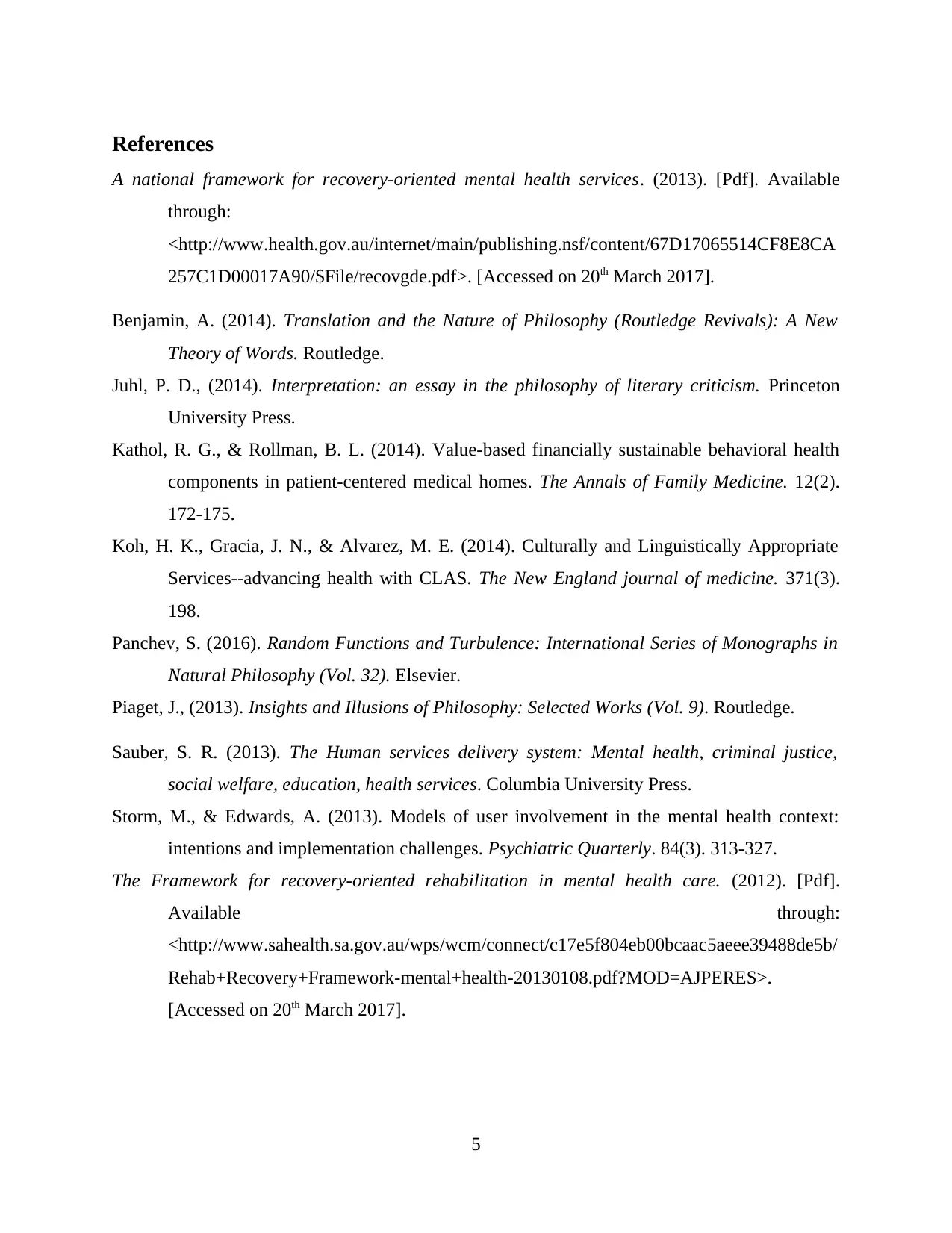
References
A national framework for recovery-oriented mental health services. (2013). [Pdf]. Available
through:
<http://www.health.gov.au/internet/main/publishing.nsf/content/67D17065514CF8E8CA
257C1D00017A90/$File/recovgde.pdf>. [Accessed on 20th March 2017].
Benjamin, A. (2014). Translation and the Nature of Philosophy (Routledge Revivals): A New
Theory of Words. Routledge.
Juhl, P. D., (2014). Interpretation: an essay in the philosophy of literary criticism. Princeton
University Press.
Kathol, R. G., & Rollman, B. L. (2014). Value-based financially sustainable behavioral health
components in patient-centered medical homes. The Annals of Family Medicine. 12(2).
172-175.
Koh, H. K., Gracia, J. N., & Alvarez, M. E. (2014). Culturally and Linguistically Appropriate
Services--advancing health with CLAS. The New England journal of medicine. 371(3).
198.
Panchev, S. (2016). Random Functions and Turbulence: International Series of Monographs in
Natural Philosophy (Vol. 32). Elsevier.
Piaget, J., (2013). Insights and Illusions of Philosophy: Selected Works (Vol. 9). Routledge.
Sauber, S. R. (2013). The Human services delivery system: Mental health, criminal justice,
social welfare, education, health services. Columbia University Press.
Storm, M., & Edwards, A. (2013). Models of user involvement in the mental health context:
intentions and implementation challenges. Psychiatric Quarterly. 84(3). 313-327.
The Framework for recovery-oriented rehabilitation in mental health care. (2012). [Pdf].
Available through:
<http://www.sahealth.sa.gov.au/wps/wcm/connect/c17e5f804eb00bcaac5aeee39488de5b/
Rehab+Recovery+Framework-mental+health-20130108.pdf?MOD=AJPERES>.
[Accessed on 20th March 2017].
5
A national framework for recovery-oriented mental health services. (2013). [Pdf]. Available
through:
<http://www.health.gov.au/internet/main/publishing.nsf/content/67D17065514CF8E8CA
257C1D00017A90/$File/recovgde.pdf>. [Accessed on 20th March 2017].
Benjamin, A. (2014). Translation and the Nature of Philosophy (Routledge Revivals): A New
Theory of Words. Routledge.
Juhl, P. D., (2014). Interpretation: an essay in the philosophy of literary criticism. Princeton
University Press.
Kathol, R. G., & Rollman, B. L. (2014). Value-based financially sustainable behavioral health
components in patient-centered medical homes. The Annals of Family Medicine. 12(2).
172-175.
Koh, H. K., Gracia, J. N., & Alvarez, M. E. (2014). Culturally and Linguistically Appropriate
Services--advancing health with CLAS. The New England journal of medicine. 371(3).
198.
Panchev, S. (2016). Random Functions and Turbulence: International Series of Monographs in
Natural Philosophy (Vol. 32). Elsevier.
Piaget, J., (2013). Insights and Illusions of Philosophy: Selected Works (Vol. 9). Routledge.
Sauber, S. R. (2013). The Human services delivery system: Mental health, criminal justice,
social welfare, education, health services. Columbia University Press.
Storm, M., & Edwards, A. (2013). Models of user involvement in the mental health context:
intentions and implementation challenges. Psychiatric Quarterly. 84(3). 313-327.
The Framework for recovery-oriented rehabilitation in mental health care. (2012). [Pdf].
Available through:
<http://www.sahealth.sa.gov.au/wps/wcm/connect/c17e5f804eb00bcaac5aeee39488de5b/
Rehab+Recovery+Framework-mental+health-20130108.pdf?MOD=AJPERES>.
[Accessed on 20th March 2017].
5
1 out of 5
Related Documents
Your All-in-One AI-Powered Toolkit for Academic Success.
+13062052269
info@desklib.com
Available 24*7 on WhatsApp / Email
![[object Object]](/_next/static/media/star-bottom.7253800d.svg)
Unlock your academic potential
Copyright © 2020–2026 A2Z Services. All Rights Reserved. Developed and managed by ZUCOL.





